- Get link
- X
- Other Apps
The 2001 Stock Market Crash: A Look Back
The stock market crash of 2001 was a significant event in financial history that had far-reaching consequences for both the economy and individual investors. In this blog post, we will take a look back at the causes and effects of the crash, as well as the actions taken by the government and the lessons learned.
Economic Factors Leading Up to the Crash
The dot-com bubble, which was characterized by a frenzy of investment in internet-based companies, had a significant impact on the stock market.
Many of these companies were overvalued, and when the bubble burst in 2000, it set the stage for a market crash. Additionally, Federal Reserve's interest rate policy, which kept interest rates low, fueled speculation and risky investments, creating the conditions for a crash. Furthermore, the economic downturn in 2001 was caused by a combination of factors such as rising oil prices, the bursting of the dot-com bubble, and the September 11th terrorist attacks. Corporate frauds were also happening around that time which can be considered as a factor for the crash.
The Crash Itself
The stock market crash of 2001 began in March and continued throughout the year. The NASDAQ, which was heavily invested in technology stocks, suffered the most, losing nearly 80% of its value. The Dow Jones Industrial Average also lost over 20%. Individual investors, who had invested heavily in the stock market, saw their savings disappear overnight. The impact of the crash was widespread, and it had far-reaching consequences for the economy.Government Response
In response to the crash, the Federal Reserve and government took several actions to stabilize the market. The Federal Reserve lowered interest rates several times to encourage borrowing and spending. The government also provided financial assistance to struggling companies to help them stay afloat. These actions helped to stabilize the market and prevent a complete collapse.
Aftermath
The stock market crash of 2001 had long-term effects on the economy and the stock market. The recovery was slow, and it took several years for the stock market to regain its pre-crash levels. Additionally, the crash led to increased regulations for public companies and their financial reporting. The Sarbanes-Oxley Act of 2002 was passed to increase the accountability of public companies and to prevent future corporate frauds.
Lessons Learned
The stock market crash of 2001 serves as a reminder of the importance of understanding past financial crises in order to better prepare for and prevent future ones. It also highlights the importance of diversifying investments and being cautious of risky investments. Furthermore, the crash also showed the importance of the regulations in the financial sector to prevent future crashes and to protect the investors.
In conclusion, the 2001 stock market crash was a significant event in financial history that had far-reaching consequences for both the economy and individual investors. Understanding the causes and effects of the crash, as well as the actions taken by the government and the lessons learned, can help us to better prepare for and prevent future financial crises.

Comments
Post a Comment